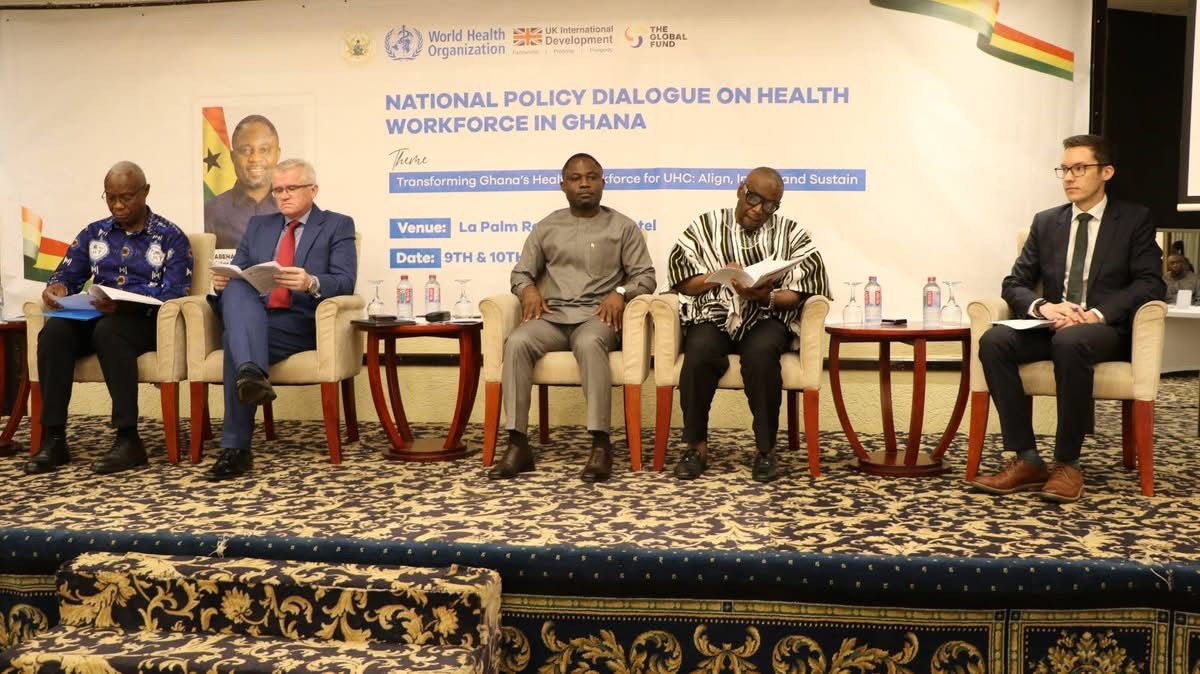Ghana Holds National Dialogue to Tackle Health Workforce Challenges

By Savannah Pokuaah Duah
Accra, Ghana — The Ministry of Health, in collaboration with the World Health Organization (WHO), has convened a high-level National Policy Dialogue to address the growing challenges facing Ghana’s healthcare workforce. Held under the theme “Transforming Ghana’s Health Workforce for UHC: Align, Invest, and Sustain,” the two-day engagement focused on devising strategic solutions to issues such as health worker shortages, skills gaps, and the increasing emigration of medical professionals.
The event gathered key stakeholders from across the health sector — including senior government officials, private and quasi-health institutions, professional associations, and international development partners — to build consensus on reforms that would strengthen Ghana’s healthcare system and accelerate progress toward Universal Health Coverage (UHC).
In his opening remarks, Health Minister Kwabena Mintah Akandoh cited findings from a recent Health Labour Market Analysis (HLMA), which painted a mixed picture of progress and persistent structural barriers. “Despite significant advancements over the last two decades, we still face major challenges in deploying and retaining our health workers,” Akandoh said. “Most troubling is the fact that nearly 40% of qualified health professionals remain unemployed, while underserved communities, particularly in rural areas, lack essential healthcare staff.”
Akandoh also raised concerns over the growing trend of health worker emigration, revealing that over two-thirds of healthcare professionals are considering relocating abroad in search of better economic prospects. He urged stakeholders to develop innovative, long-term solutions to improve workforce distribution and sustainability.
Chief Director of the Ministry of Health, Alhaji Hafiz Adam, highlighted the country’s progress in increasing the density of the public sector health workforce — from 16.56 to 41.92 workers per 10,000 people over the past 20 years. However, he emphasized the importance of analyzing HLMA insights to address critical gaps in education, job creation, and retention strategies.
“While we have made strides, this dialogue is essential to refining our policies, strengthening institutional coordination, and creating sustainable mechanisms to support our health workforce,” Hafiz said.
Participants also discussed the need for consistent funding for human resources for health (HRH), improved regulatory structures, and enhanced collaboration between government and private sector actors. A panel session was held to examine reforms aimed at improving health worker job markets, defining professional roles more clearly, and ensuring resilient systems of recruitment, training, and deployment.
The National Policy Dialogue concluded with a unified commitment to strengthening Ghana’s health workforce through coordinated, evidence-based reforms. Stakeholders agreed to prioritize long-term investments in human resources, supported by strong policy frameworks and international partnerships, as part of Ghana’s broader effort to achieve equitable and quality healthcare for all.

Credit: WHO


0 Comments
No Comments available. Be the first to comment on this post
Leave a Comment
Your email address will not be published. Required fields are marked *